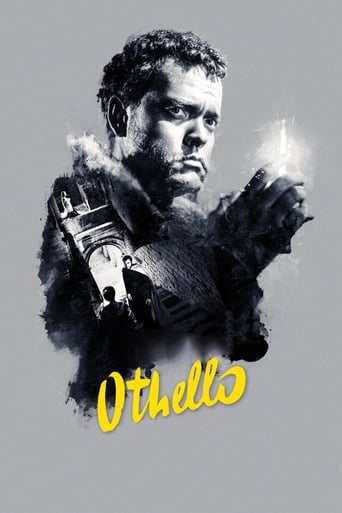Fraser Rew
No, I'm not trolling. I like a lot of Shakespeare's plays so I thought I'd try Othello. I hope it's the last time I see any version of probably the most implausible movie I've ever seen. In case you missed it:
* Someone suggests to Othello, a newly married man who's infatuated with his wife, that she's cheating on him. Instead of telling him he's out of line, Othello believes him.
* He goes on a military campaign and takes with him not just his wife, but also her maid.
* He tramples on a handkerchief that he later says is of utmost sentimental value to him.
* Despite being in charge of the Venetian army, he has hours every day to talk one-on-one, to one of his advisers, about his personal life.
* Iago and Cassio have a conversation about Bianca in which Cassio doesn't once mention Bianca's name.
* Desdemona mentions Cassio all the time. If she was having an affair with him, wouldn't she try to make it a bit less obvious?
* Roderigo tells Iago that he doesn't trust him, and not thirty seconds later agrees when Iago suggests he kill Cassio.
* Cassio, dying, says that he had two killers, but nobody bothers to look for the second one.
* Othello overhears a conversation between Emilia and Desdemona which makes it clear that Desdemona has done nothing wrong, but still thinks she's being unfaithful to him.
* Despite the fact that there's precisely, exactly, zero chemistry between Cassio and Desdemona when they're together, and the fact that nobody but Iago is suspicious, and that Cassio is already seeing someone else, and that Othello raises his suspicions with not a single other person, and the overheard conversation, he still thinks she's unfaithful.
* He locks himself in their bedroom, knowing that Emilia has seen him, before he kills her, making him the only possible murderer.
* When Emilia points out that Desdemona is (was) innocent, Othello, having been sure enough of her guilt for days and days, and sure enough to kill her only ten minutes earlier, suddenly decides she was innocent.
OK, so I get that people don't always act rationally when love is involved, but seriously, that doesn't even explain even half of the above.
I did battle my way to the end of it, but honestly, that's an hour and a half of my life that I'll never get back.
sharky_55
This adaptation of the Shakespearean tragedy manages to be compelling despite its infamous and troubled production. Othello's majestic coat lined with mink fur is none other than the same one stolen from the set of The Black Rose. Whole sequences seems missing and compositions and edits are at times jarring and sparse; ADR is visible in many instances. The moor's impressive army had to be cleverly concealed or else the truth would have been evident; nothing but a rag tag bunch of extras. The crucial death scene of Roderigo is shot within a bathhouse because of the lack of costuming. And Suzanne Cloutier's Desdemona seems perhaps a little thin compared to Welle's screen presence - then again, she was only the third actress cast in the role. But it is compelling all the same. The soundtrack's troubled restoration process does not take away from its presence. In one particular moment, right after Othello's mind has been corrupted by Iago's lies, he seeks to confront his guilty wife. As Desdemona floats into the frame, a demure flute tune sets the mood, but as Othello demands her hand to check if it is moist, the strings suddenly chime in ominously. It offers information alongside Welles' glare. A heavy piano note suddenly drops onto the track when Desdemona seemingly innocuously brings up the issue of restating Cassio, not knowing how damning this statement is in her husband's raging mind. And then they spar, with her not budging up the issue, and him demanding the handkerchief. Oh it's wonderfully ironic how at odds their intentions are. But Shakespeare has to be given credit for this confrontation. Here Othello is asking a question he already knows the answer to, condemning her even before she gives that fatal answer. Anything short of magically conjuring the handkerchief to show Othello (even that in itself might have been refused and called an act of witchcraft that Othello himself is initially accused of) is just confirming his suspicions. Early on in the film there is a narrator who introduces us to settings and happenings as if any viewer would not already be familiar with the famous Shakespeare play, but Welles wisely does away with him and his obtuse dialogue (then again, Welles' also does not include any of Iago's soliloquies which map out his plan like a step-by-step guide). The lines are cut heavily; despite being one of Shakespeare's longer works the film only clocks in at 91 minutes, nothing compared to some of the line-by-line mammoth adaptations that leave no word behind. There are some weird editing choices that accentuate this; Othello and Desdemona embrace and he whispers that they have but an hour to consummate their marriage, before we cut and suddenly it has been weeks at sea and they are eagerly reunited at Cyprus. But the narrative's most important moments remain and that is sufficient. It is not purely theatrical and relying on its performances; the film is full of disconcerting cinematography that is appropriate for the addled mind of Othello. There is no flat theatre stage here. When he slips into his trance, we get a reverse bird's eye of sorts, where we are looking directly up at the sky, and the camera spins and spins and spins as the upside-down crowd look up in puzzlement. The same disorientating effect is used when he is trapped in the room of his murder forever - the walls are blurred and closing in. The original play might prefer Iago to take the soliloquy spotlight, but Welles' visualises contemplation in his own way, by forcing the confusion and agony of his face back at him through the mirror. In a clever shot Iago is talking to Othello out of frame; oh but he is there anyway, in the mirror and seized up in concentration. Desdemona stares innocently right into the lens and into Othello's soul, and he later does the same to Iago; this technique effectively characterises his growing distress and unnerve. The lighting also aides this process; from the natural sun bathed beaches, Othello is then slowly enveloped by the darkness, until only his pupils, as green as can be even in the black and white film-stock, can be seen in the sunlight. In that final speech where he implores the men to record this story in an unbiased manner (although he himself shows signs of bias), his entire body save his face is wrapped by complete darkness. He has been enveloped and corrupted by his absolute jealously.
bigverybadtom
The movie starts with the scene after the events of the story. Without dialogue, we see the doomed Othello and Desdemona in a funeral procession, while Iago is placed in a suspended cage as punishment for his crimes. A powerful scene-but unfortunately the depiction of the story fails.The fatal error was the fact that while the dark visuals are impressive, I found the dialogue literally impossible to understand, let alone follow. This made the story genuinely impossible to follow- and the story did not even seem to much follow the original Shakespeare play. I cannot comment on how the original film might have been, but the restoration is a failure.
Scott44
***User reviewer Abhijoy Gandhi ("Welles' indomitable spirit in the face of penury shines in yet another Wellesian Masterpiece", Abhijoy Gandhi from Philadelphia, USA, 10 January 2004) has a nice summary and good background info. Also, Jonathon Dabell ("Excellent version of the great Shakespearean tragedy, distinguished by fine camera work and powerful performances", Jonathon Dabell (
[email protected]) from Todmorden, England, 17 January 2007) also has a nice summary. Finally, EddieK discusses ("Welles' images match the beauty of Shakespeare's language", EddieK from United States, 3 January 2006) the controversies associated with the restoration.***"Othello" (1952, Orson Welles) is an enjoyable trip back in time. The difficulty that Orson Welles had making it is another piece of his legend. It is low-budget and was filmed over three years. Welles took several breaks to act elsewhere in order to raise more money for the financially-starved project. When period costumes don't arrive in time he famously improvises scenes in a Turkish bath. When his actor playing Roderigo (Robert Coote) isn't available for post-production dubbing, Welles (capably) dubs the other man's voice himself.The result is very entertaining, clearly one of the greatest adaptations of William Shakespeare so far. There are many reasons to admire it. The most obvious is how it looks. The starkness of so many exteriors and the oppression that is felt with the palatial interiors is vintage Welles. Then there are the relatively quick jumps and fragments of Shakespearean dialog that are always spoken by quickly (without regard for whether a contemporary audience can decipher it in time before the next line). All of these details contribute to the sense that the viewer has been transported back to the Middle Ages.Welles in (very inconsistent) black makeup plays Othello the general, another leader in Shakespeare's canon who loses his sanity. Welles' familiar, rich baritone, so unique and pleasant to the ears, lends much gravity to the unwell Moor. (BTW, there is a funny moment when we see the back of Welles' neck and can see the makeup line between his artificially dark complexion and his natural skin color--woops.)The rest of the cast hangs with Welles. Suzanne Cloutier is a very beautiful and tragic Desdemona that serves to make Othello seem crazy in comparison. Some Shakespeare purists may object to Robert Coote's somewhat dim Roderigo, but the actor seems to be living the role. Doris Dowling, who must have been one of the prettiest actresses of that era, has a minor role as a GF/prostitute of Cassio (Michael Laurence. Also, Joseph Cotton apparently appears, but I missed him.) However, the essential figure in the cast is Micheál MacLiammóir as Iago. This Iago is depicted as a wretched, diminutive fellow incapable of charm. This interpretation of Iago may be controversial, as his treachery is always very obvious. However, along with Welles's Hellish direction MacLiammóir's grave delivery fits perfectly (making The Middle Ages seem a more difficult era to endure than the post-911 present).Desdemona's fate not withstanding, watching Iago manipulate Othello into the latter's downfall is fun. The little guy is quite the nasty bastard. The great Orson Welles is sorely missed today.




